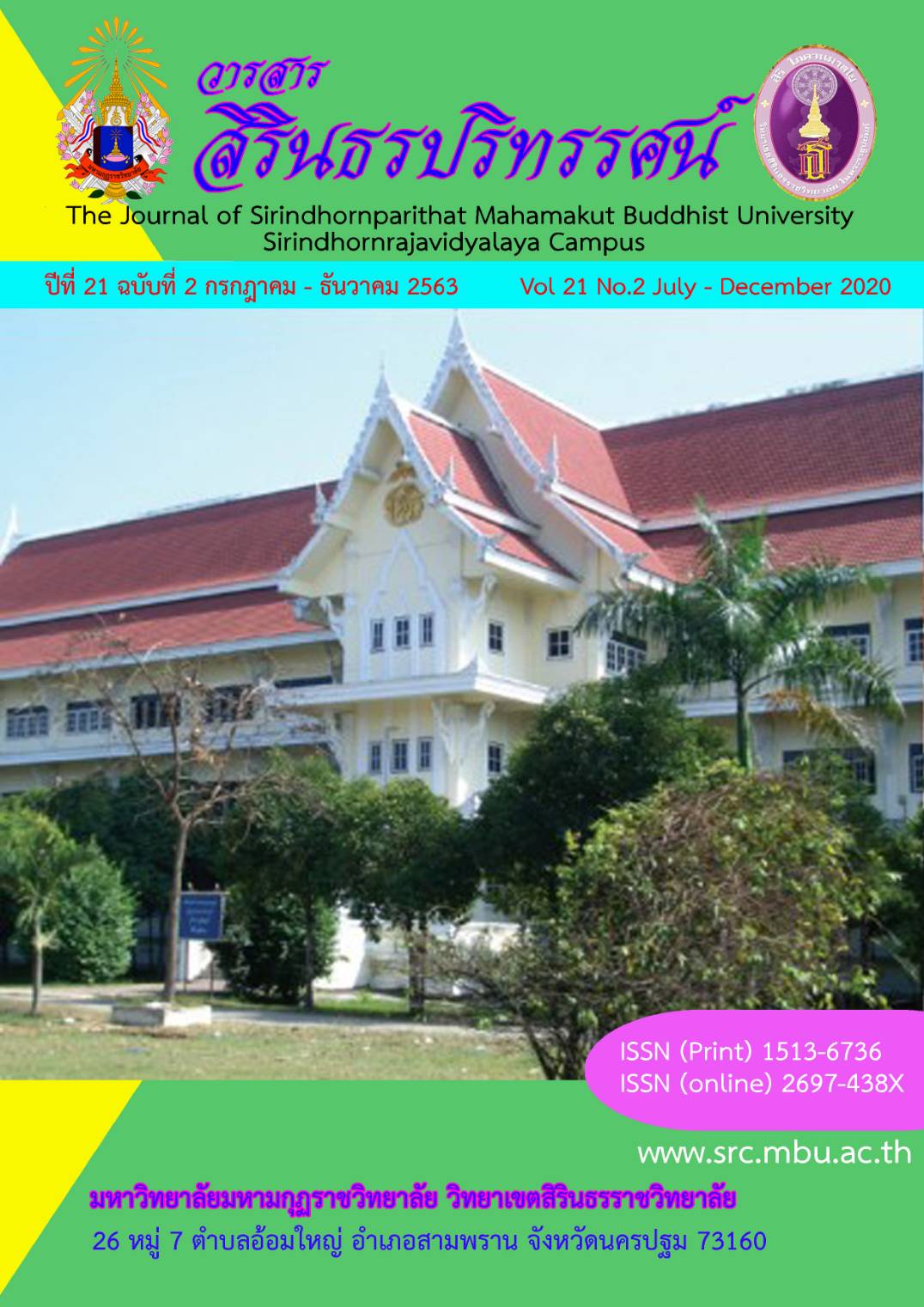A Relationship between Buddhist Ethics and Organizational Justice
Keywords:
Buddhist Ethics, Four Sublime Sates of Mind, Rules of Karma, Organizational CultureAbstract
The purposes of this research were: (1) to study the perceptions of employees towards recognition of justice from Buddhist ethics; (2) to study the perceptions of employees towards organizational justice; (3) to study a relationship between Buddhist ethics and organizational justice; and (4) to study the Buddhist ethics influencing organizational justice. The samples used in this study were 350 employees who work in private organizations in Bangkok. The instrument used to collect data was a research questionnaire. Statistics used in this research consisted of Percentage, Mean, Standard Deviation, Correlation, and Multiple Regression Analysis.
The research findings were as follows:
- The perceptions of employees towards recognition of justice from Buddhist ethics, in total, were at a high level. In particular, the belief in the rule of Karma had the highest mean value, followed by the four sublime states of mind, whereas avoidance of four prejudices was at a moderate level.
- The perceptions of employees towards organizational justice, in total, were at a high level. In particular, interactional justice had the highest mean value, followed by procedural justice, whereas distributive justice was at a moderate level.
- The correlation coefficient between Buddhist ethics and organizational justice was at 0.01 level of significance with a correlation value between .124 to .396, which the highest correlation was a relationship between the four sublime states of mind and organizational justice.
- Buddhist ethics which had the highest influence on organizational justice were the four sublime states of mind, followed by avoidance of four prejudices and the belief in the rules of karma respectively.
References
ชะวัชชัย ภาติณธุ. (2548). สาระที่ถูกมองข้ามทางวัฒนธรรม. กรุงเทพฯ: สำนักพิมพ์โอเดียนสโตร์.
บุรัญชัย จงกลนี. (2528). คุณธรรมของนักบริหาร. ขอนแก่น: คณะศึกษาศาสตร์ มหาวิทยาลัยขอนแก่น.
พระครูศรีปริยัติวิธาน (พระมหาแม้น คุปตรํสี). (2563). “ความคิดเห็นของประชาชนต่อการป้องกันและรักษาโรคติดเชื้อโควิด-19 ตามหลักอริสัจ 4”. วารสารศิลปะการจัดการ, 14(3), 521-536.
พระพรหมคุณาภรณ์ (ป.อ.ปยุตฺโต). (2558). พจนานุกรมพุทธศาสตร์ ฉบับประมวลธรรม. กรุงเทพฯ: สำนักพิมพ์ผลิธรรม.
พระเมธีธรรมาภรณ์ (ประยูร ธมฺมจิตฺโต). (2539). พุทธศาสนากับปรัชญา. กรุงเทพฯ: สำนักพิมพ์อมรินทร์ปรินติ้ง กรุ๊พ จำกัด.
พระมหาหรรษา ธมฺมหาโส, รศ.ดร. (2555). ความยุติธรรมในมุมมองของพุทธศาสตร์. สืบค้นเมื่อ 20 ตุลาคม 2563 จาก https://ps.mcu.ac.th.
พุทธทาสภิกขุ. (2542). จริยธรรม (การเสริมสร้างจริยธรรมสำหรับเด็กวัยรุ่น). กรุงเทพฯ: เม็ดทราย พริ้นติ้ง.
มหาจุฬาลงกรณราชวิทยาลัย. (2539). พระไตรปิฎกภาษาไทย ฉบับมหาจุฬาลงกรณราชวิทยาลัย. กรุงเทพฯ: มหาจุฬาลงกรณราชวิทยาลัย.
ราชบัณฑิตยสถาน. (2554). พจนานุกรมฉบับราชบัณฑิตยสถาน พ.ศ. 2554 เฉลิมพระเกียรติพระบาทสมเด็จพระเจ้าอยู่หัวเนื่องในโอกาสพระราชพิธีมหามงคลเฉลิมพระชนมพรรษา 7 รอบ 5 ธันวาคม 2554. กรุงเทพฯ : ราชบัณฑิตยสถาน.
วิกิพีเดีย สารานุกรเสรี. (2559). ความยุติธรรม. สืบค้นเมื่อ 2 มีนาคม 2559 จาก https://th.wikipedia.org/wiki/.
สมเด็จพระญาณสังวร สมเด็จพระสังฆราช สกลมหาสังฆปริณายก. (2545). ศีลและพรหมวิหาร 4. กรุงเทพมหานคร: ธรรมสภา
สุขุมพงศ์ ชาญนุวงศ์. (2555). นี่แหละ...คือสิ่งที่พระพุทธเจ้าสอนไอน์สไตน์ให้ฉลาดและมีความสุข. นนทบุรี: สำนักพิมพ์ ธิงค์ บิยอนด์.
สุขุมพงศ์ ชาญนุวงศ์ และบุญวดี มนตรีกุล ณ อยุธยา. (2560). “การประยุกต์ใช้หลักธรรมาภิบาลที่ส่งผลต่อความยุติธรรมในองค์การ”. วารสารการวิจัยเพื่อพัฒนาชุมชน, 10(3), 36-47.
สุภาพร ทรงกิจทรัพย์. (2550). “หลักจริยธรรมกับการบริหารทรัพยากรมนุษย์”. วารสารศรีปทุมปริทัศน์, 7(2), 114-121.
Channuwong, S., Ruksat, S., & Ploychum, S. (2018). “An integration of Buddhist teachings in stress management”. Journal of Community Development Research, 11(4),148-158.
Folger, R. (1998). Organizational justice and human resource management. Thousand Oaks, CA: Sage.
Greenberg, J. (1990). “Employee theft as a reaction to underpayment inequality: The hidden cost of a pay cut”. Journal of Applied Psychology, 75, 561-658.
Moorman, R. H. (1991). “Relationship between organizational justice and organizational citizenship behaviors: Do fairness perception influence Employee citizenship?”. Journal of Applied Psychology, 76, 845-855.
Downloads
Published
Issue
Section
License
บทความที่ได้รับการตีพิมพ์เป็นลิขสิทธิ์ของ มหาวิทยาลัยมหามกุฏราชวิทยาลัย วิทยาเขตสิรินธรราชวิทยาลัย
ข้อความที่ปรากฏในบทความแต่ละเรื่องในวารสารวิชาการเล่มนี้เป็นความคิดเห็นส่วนตัวของผู้เขียนแต่ละท่านไม่เกี่ยวข้องกับหาวิทยาลัยมหามกุฏราชวิทยาลัย วิทยาเขตสิรินธรราชวิทยาลัย และคณาจารย์ท่านอื่นๆในมหาวิทยาลัยฯ แต่อย่างใด ความรับผิดชอบองค์ประกอบทั้งหมดของบทความแต่ละเรื่องเป็นของผู้เขียนแต่ละท่าน หากมีความผิดพลาดใดๆ ผู้เขียนแต่ละท่านจะรับผิดชอบบทความของตนเองแต่ผู้เดียว




